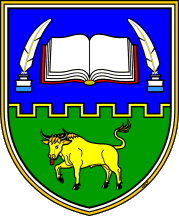Reformation City Rasica
Slovenia
Rasica

Truber’s home village
Rašica is a small village to the north of the municipality of Velike Lašče in central Slovakia. There is evidence of dioceses from as far back as the 3rd century in this former Roman province. Following renewed systematic missionary efforts during the 8th century, the region’s churches joined the Aquileia Patriarchy. Politically, Rašica belonged to the Duchy of Carniola and was ruled by the Habsburgs between 1335 and 1908.
Rašica is famous for being the birthplace of the Slovenian Reformer Primož Truber. He was born Primus Malnar on 9 June 1508 in Rašica, in the parish of Škocjan pri Turjaku/Sankt Kanzian near Auersperg in the Dolenjska region. His father, who had made a fortune as a carpenter and miller, commended him to the priesthood. In his early teens, he adopted his mother’s surname of Trubar, which he soon modified to Truber.
As a 16-year-old candidate in Trieste, he was introduced to the Humanist writers, primarily Erasmus of Rotterdam, by Bishop Pietro Bonomo (1502-1546) and became his student. After returning from studies in Vienna, Bonomo ordained Truber as a priest in 1530. His first post was as the town pastor of Laško.
Truber’s Reformist sermons, which he conducted in Slovene, caused conflict with his church. Nonetheless, he was made a canon of Ljubljana Cathedral in 1542. While a Catholic canon, he spread Reformist ideas and became a key proponent of the Reformation movement in the capital city. Reformist preaching had commenced in Ljubljana as early as 1523. The imperial guilds of Carniola helped the Reformation movement to spread. They took it upon themselves to revise church structures and founded a Protestant school in the capital.
However, things changed after Bonomo’s death. His successor implemented the Habsburgs’ anti-Reformation stance in the diocese. In 1548, Truber fled to Nuremberg, where he explicitly committed himself to the Reformation. Then between 1553 and 1561, he steered the free imperial city of Kempten towards Lutheranism as its pastor.
He had started his life’s major work on foreign soil, in southern Germany, in 1550 – to promote the Slovenian Reformation by publishing Reformist works in his native language. He completed most of the translations into Wendish himself. These included a catechism, a Slovenian church order and the complete New Testament along with parts of the Old. He translated the Biblical scriptures based on the Lutheran Bible. In 1561, he oversaw the team in the Württemberg town of Urach – which included his compatriot Hans Ungnad – that founded the “Ungnad-Trubersche Bibelwerk”, a printing centre dedicated to producing Reformation works in Slovene, Croatian and Italian. By publishing Biblical and catechetical texts in Slovene, Truber was in fact instrumental in developing a written Slovenian language, which had previously not existed as such.
In 1562, he returned to Ljubljana as a superintendent with the aim of establishing a Slovenian Church, but he was forced to leave again just three years later after the new ruler, Archduke Karl, banned him from preaching. He found refuge in the Lutheran Duchy of Württemberg. From 1567 until his death, he was the pastor of Derendingen near Tübingen. During this time, he continued his lifework of translating and publishing Slovenian works in the Urach printing house.
Truber’s Reformation in Slovenia was brought to an end by the successful imposition of the Counter-Reformation during the first third of the 17th century. From that point on, Protestant Christians lived their faith as “clandestine Protestants”. New congregations were formed following the Patent of Toleration issued by Joseph II in 1781. The independent Slovenian Church A.C. (Augsburg Confession) was founded in 1945. It asserts its status in this predominantly Catholic country as a small but committed minority church.
Truber, who had fallen into obscurity for a long time, is now celebrated in Slovenia as the creator of written Slovenian. His face can be found on the country’s one-euro coin. Reformation Day on 31st October is a national holiday. A museum in Rašica commemorates the Trubar farm where the Reformer was born.
Links
Rašica: www.velike-lasce.si
Protestant Church A.C. in Slovenia: www.evang-cerkev.si

